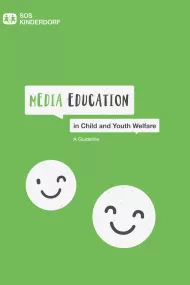This handbook is aimed at pedagogical professionals who work in child and youth welfare. Media and the Internet have become an integral part of the everyday lives of children, young people and their families, and thus also of the lives of pedagogical staff in child and youth welfare. Particularly in the field of child and youth welfare, it is important to support the addressees as much as possible, on the one hand by giving them the freedom to acquire media competence, but at the same time by offering educational opportunities.
The guidline takes a practical look at the digital lives of children and young people and deals with topics such as fake news, digital games or sexuality and self-presentation on digital media. It offers tips for pedagogical professionals, shows examples from practice and gives impulses for everday pedagogical life. It also answers FAQS from children and youths as well as from pedagogical professionals and provides information about the legal situation conercning these topics in Austria.
This handbook is aimed at pedagogical professionals who work in child and youth welfare. Media and the Internet have become an integral part of the everyday lives of children, young people and their families, and thus also of the lives of pedagogical staff in child and youth welfare. Particularly in the field of child and youth welfare, it is important to support the addressees as much as possible, on the one hand by giving them the freedom to acquire media competence, but at the same time by offering educational opportunities.
The guidline takes a practical look at the digital lives of children and young people and deals with topics such as fake news, digital games or sexuality and self-presentation on digital media. It offers tips for pedagogical professionals, shows examples from practice and gives impulses for everday pedagogical life. It also answers FAQS from children and youths as well as from pedagogical professionals and provides information about the legal situation conercning these topics in Austria.
- < Previous resource
- Next resource >
- < Previous
- Next >






